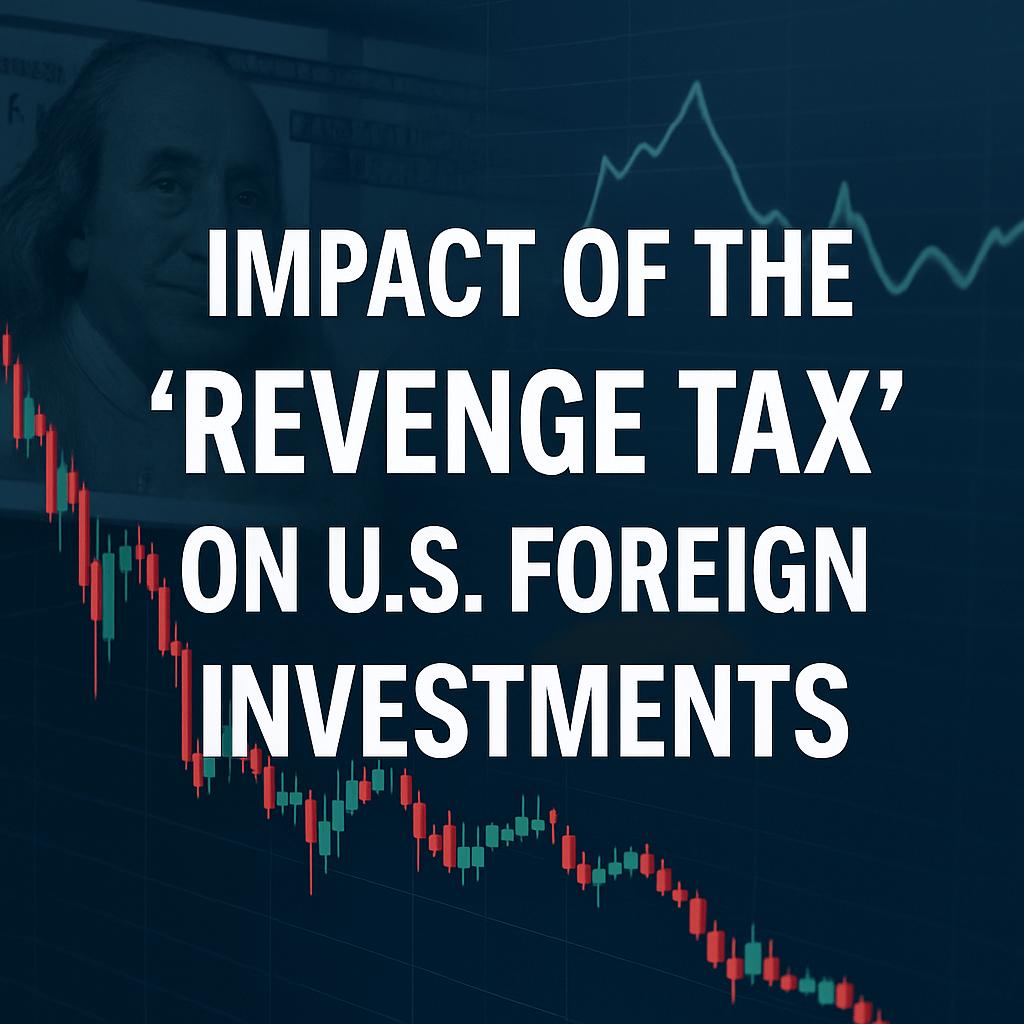Impact of the ‘Revenge Tax’ on U.S. Foreign Investments

As U.S. lawmakers continue to debate the provisions of the significant budget bill, more focus is being directed toward Section 899, which has gained notoriety as the ‘revenge tax.’ Initially overlooked amidst broader deficit discussions, this provision introduces a new dynamic into the U.S. investment landscape, raising concerns on Wall Street regarding its implications for foreign investment inflows.
What is Section 899?
Section 899 proposes increased tax rates on individuals and corporations from countries deemed to have “discriminatory” tax policies. This designation could notably impact foreign investors, who collectively hold trillions of dollars in U.S. assets, particularly through passive income avenues such as dividends, interest, and capital gains. Analysts warn that this potential tax hike could serve to deter foreign capital from entering U.S. markets, thus exacerbating an already fragile investment climate.
The ‘Revenge Tax’ Explained
- Discriminatory Tax Policies: The term encapsulates a range of practices perceived as unfairly disadvantaging U.S. firms or investments. Countries targeting U.S. multi-nationals with excessive taxes or legislative barriers could find their investments taxed more heavily in the U.S.
- Scope and Implementation: The parameters for determining which countries’ tax policies will be subject to these increased rates remain vague, allowing for broad discretion in enforcement. This uncertainty can further deter investment, as foreign firms grapple with potential financial repercussions.
- Potential Economic Consequences: Deutsche Bank’s analysis points to an estimate indicating that the ‘revenge tax’ could reduce yields on U.S. Treasury bonds by nearly 100 basis points for foreign governments, creating a negative feedback loop of diminishing demand for U.S. debt instruments.
Market Reactions and Wider Implications
As U.S. assets have already seen a decline in attractiveness, analysts observe a shift toward European and Chinese markets. The ‘revenge tax’ could exacerbate this trend, transforming a trade war into what Deutsche Bank’s George Saravelos refers to as a potential capital war.
In light of a recent U.S. trade court ruling that invalidated certain reciprocal tariffs imposed under the previous administration, Section 899 emerges as a possible alternative avenue for leveraging U.S. economic interests globally. Saravelos indicates that the legislation equips the U.S. administration with a tool to exert pressure without formal trade measures.
Concerns from Lawmakers and Economists
During a panel discussion, Jason Smith, the House Ways and Means Committee Chair and supporter of the ‘revenge tax,’ expressed an intention for this provision to act mainly as a deterrent, rather than a punitive measure. However, the apprehension surrounding its actual implementation remains.
The Joint Committee on Taxation, a non-partisan entity, has affirmed concerns echoed by financial analysts. Chief of Staff Thomas Barthold noted that the ‘revenge tax’ could lead to a significant decline in foreign demand for U.S. direct and portfolio investments, a potential downturn that could destabilize U.S. economic growth prospects.
Global Context and Future Outlook
The context of increasing protectionism and nationalism in trade policies globally adds a layer of complexity. As nations recalibrate their economic strategies in light of perceived unfair practices, the U.S. could find itself isolated if it fails to uphold an investment-friendly environment. The responses from foreign governments to U.S. tax policy changes could create retaliatory measures, further complicating foreign investment dynamics.
Given the evolving geopolitical framework and economic interdependencies, investors worldwide are reevaluating risk thresholds, with many possibly opting for more stable environments. As uncertainty persists around the potential implementation of Section 899, the ramifications for capital inflow into the U.S. cannot be underestimated.
Conclusion
In summation, the looming threat of the ‘revenge tax’ may serve as a significant deterrent to foreign investment, potentially leading the U.S. into a less favorable position in the global financial landscape. Stakeholders must remain vigilant and engaged with these developments to navigate the complexities arising from this evolving legislative landscape.
Author: Jason Ma, Weekend Editor at Fortune. Covers markets, the economy, finance, and housing.